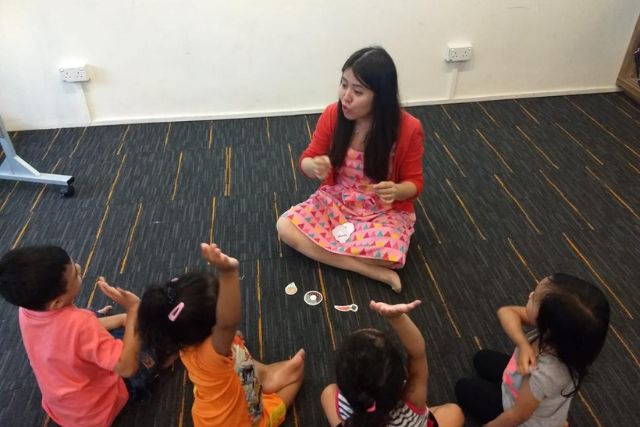 When junior drops the big question on your bulging bellies, what do you say to him or her? What do we say?
When junior drops the big question on your bulging bellies, what do you say to him or her? What do we say?
Here are 5 useful tips for parents to talk to their child about where babies come from.
1. Use proper labels
We ought to begin teaching our children about sex and their sexuality from the time of their birth. And this begins with simple labeling of their anatomy. For the record, boys have penis and not “ku-ku-bird” or a “pee-pee” or “birdy”. Girls have a vagina (and actually the vagina is only part of the female genitalia; it actually is called the vulva) and not a “wee-wee” or a “peach” or a “hamburger”. Proper labeling will lay the ground foundation for future discussions.
I bumped into my niece and nephew one Saturday evening when my sister and brother-in-law took them out for a family dinner. As I was about five months pregnant, my niece who was 4 years old jumped out of her chair and asked me excitedly, “Yee Yee (which means aunty), do you have a baby in your womb?” I was amazed at how she knew the word “womb” at the age of four!
My sister then explained that she bought a child-appropriate storybook to introduce the subject to her. My sister and brother-in-law insisted on proper labeling of their children’s anatomy and body parts at a young age and indeed has helped their children to learn properly and made it easier for them as parents to introduce the subject when needed.
2. Be comfortable to discuss the topic
Because modeling a healthy relationship between men and women is every bit as important as the actual conversations we have with our kids about sex, the first task we must approach as parents is exploring and discussing our own beliefs and feelings about the subject. Do discuss the subject between you and your spouse first, and process any fears you may have about raising the subject as honest as you can before approaching your child on the issue.

If we can’t be comfortable talking about the subject between the husband and wife, how can we expect that our child will be comfortable to bring up the subject with us? Working out on our own issues as parents with our pasts and with each other about sex and sexuality will allow us to be a blessing to our children, and that we will be able to talk to our children effectively.
Think of how much less afraid our children will feel if they knew that their parents have experienced the same feelings and can model how to deal with them in a healthier way. If need be, age-appropriately, be willing to share your story and journey with them. Let them know that they are not alone, and that you wish to help them to overcome the challenges.
3. Go beyond the birds and the bees

Most parents say too little, or too late. Even if they successfully transmit information about the biology of sex, most parents considered that the case is closed and issue is resolved. They don’t realize that our children will continue to question and learn about sex and sexuality through what they observe around them as they grow up. It is very crucial for parents to take the conversation to the next level.
What I mean by taking it to the next level is to teach and model healthy male and female relationships. By doing so, this will create a vision in our children’s minds and hearts on how a rich and fully developed relationship that married couples can enjoy looks like. If you are remarried or are living alone, you can still do a good job in educating your kids about healthy sexuality. While it is good for a child to hear about sexuality from both a man and a woman at the same time, that is not always possible, even for married couples.
Taking it to the next level would also mean to take the opportunity for parents to communicate about our values about sex gently to our children. Although they may not understand or adopt these values when they are older, at least they will be aware of them as they struggle to figure out how they feel and want to behave.
Related Post: Watch a video of how parents talk to their kids on the birds and the bees for the first time
4. Give accurate, age-appropriate information
“It is important to discern at what stage of understanding and maturity the child is at before deciding on how much to share.” Page, 42-year-old teacher and a mother of two teenagers 16 and 14 years old advised. This is important. Talk about sex in a way that fits the age and stage of your child. A four-year-old doesn’t need to know every detail of the sexual acts, but you can lay a solid foundation for later.
5. Whose responsibility is it?
It is a myth that only a woman can talk to a female child and only a man can talk to a male child. Some of the most wonderful conversations take place between a mother and her son or between a father and his daughter. This would illustrate to children that men and women don’t need to be a mystery to each other, and that in many ways, our sexual needs are not entirely different. Establishing a pattern of talking freely with any of your children on any subject will serve you well as they mature and will enable you to have a series of ongoing, productive conversations.
While there may be moments that you may correctly sense that your child may wish to speak to someone of the same gender, same-sex gender perspectives can sometimes help a child, especially adolescents and teenagers, to feel more comfortable and possibly less embarrassed.
You may find it helpful to have also someone of the opposite sex, someone whom you have a mature non-sexual relationship with, to serve as a role model and guide for your child. Your parents, religious advisors, or child’s teachers may be excellent candidates. But remember that you will still be the one who will have most of the conversations with your child. There is no reason you cannot be the best resource for your child. We can be effectively well equipped to answer their questions and to support them in this journey.
By Yvonne Chee
If you find this article useful, do click Like and Share at the bottom of the post, thank you.
Like what you see here? Get parenting tips and stories straight to your inbox! Join our mailing list here

























































